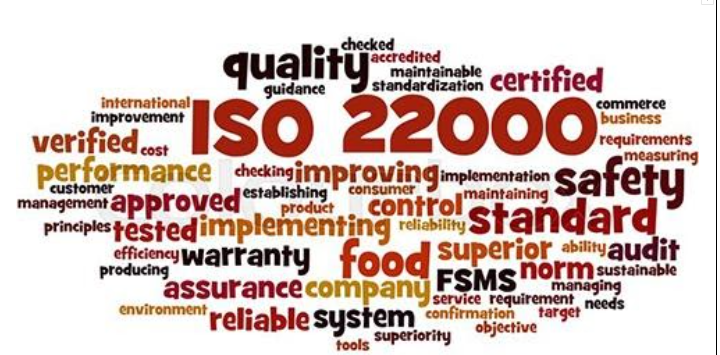
I. Introduction
A. Explanation of ISO 22000 Certification
ISO 22000 Certification serves as a globally recognized standard for food safety management systems. It outlines requirements for organizations involved in the food industry to ensure the safety of their products throughout the food supply chain. This certification covers various aspects, including interactive communication, system management, prerequisite programs, and the implementation of Hazard Analysis and Critical Control Points (HACCP). Essentially, ISO 22000 provides a framework for businesses to demonstrate their commitment to producing safe and quality food products.
II. Steps to Achieve ISO 22000 Certification
A. Conducting Hazard Analysis and Identifying Critical Control Points (HACCP)
To kick-start the journey towards ISO 22000 certification, the first crucial step involves conducting a comprehensive hazard analysis and identifying critical control points (HACCP). This process entails a thorough examination of potential hazards within the food production or handling process, whether biological, chemical, or physical. By pinpointing critical control points, businesses can establish preventive measures to mitigate risks effectively. These measures are pivotal for ensuring the safety and integrity of the food supply chain.
B. Developing and Implementing a Food Safety Management System (FSMS)
Subsequently, the focus shifts to the development and implementation of a robust Food Safety Management System (FSMS). This system serves as the framework through which organizations manage and control food safety hazards. It encompasses various elements, including documented procedures, policies, and protocols tailored to the specific requirements of ISO 22000. By establishing an FSMS, businesses can streamline their operations, enhance traceability, and foster a culture of continuous improvement in food safety practices.
C. Implementing Prerequisite Programs and Operational Hygiene Practices
In conjunction with the FSMS, implementing prerequisite programs and operational hygiene practices is fundamental in achieving ISO 22000 certification. These programs lay the groundwork for maintaining a hygienic and safe environment throughout the food production process. This includes measures such as sanitation procedures, pest control, and maintenance of facilities and equipment. By adhering to stringent hygiene standards and implementing prerequisite programs, organizations can minimize the risk of contamination and uphold the integrity of their products.
III. Benefits of ISO 22000 Certification
A. Ensuring the safety and quality of food products
ISO 22000 certification offers a paramount assurance of the safety and quality of food products. By adhering to the rigorous standards set forth by the International Organization for Standardization (ISO), businesses can establish robust systems and processes to identify, mitigate, and manage food safety hazards effectively. This not only safeguards consumers from potential risks associated with contaminated or unsafe food but also enhances the overall quality and integrity of the products.
B. Enhancing Consumer Trust and Confidence in Food Safety Practices
One of the significant advantages of ISO 22000 certification is its role in bolstering consumer trust and confidence in food safety practices.With growing concerns about foodborne illnesses and product recalls, consumers are increasingly vigilant about the safety and quality of the food they consume.ISO 22000 certification serves as a tangible indicator of a company’s dedication to maintaining stringent food safety standards.This, in turn, instills confidence among consumers, assuring them that the products they purchase have undergone thorough scrutiny and adhere to internationally recognized benchmarks for food safety.
C. Compliance with Regulatory Requirements and International Standards
ISO 22000 certification ensures compliance with regulatory requirements and international standards governing food safety.In an increasingly interconnected global market, adhering to standardized practices is essential for accessing international markets and ensuring the smooth flow of goods across borders.By obtaining ISO 22000 certification, organizations demonstrate their commitment to meeting not only mandatory regulatory obligations but also voluntary standards that reflect best practices in food safety management.This proactive approach to compliance not only mitigates the risk of regulatory violations but also fosters a competitive edge in the marketplace by signaling a commitment to excellence in food safety.
IV. Continuous Improvement and Maintenance of ISO 22000 Certification
A. Importance of Continuous Improvement in Food Safety Management
Continuous improvement lies at the heart of maintaining ISO 22000 certification and ensuring the efficacy of food safety management systems (FSMS). It involves a proactive approach to identifying areas for enhancement and implementing measures to address them. By continuously refining processes, procedures, and protocols, organizations can stay ahead of emerging food safety risks, enhance operational efficiency, and uphold the highest standards of quality and safety in their products.Embracing a culture of continuous improvement fosters innovation and resilience, enabling businesses to adapt to evolving challenges and opportunities in the dynamic landscape of food safety management.
B. Techniques for Ongoing Monitoring, Measurement, and Evaluation of FSMS Effectiveness
Monitoring, measurement, and evaluation are essential techniques for ensuring the ongoing effectiveness of FSMS. This entails systematically collecting and analyzing data related to key performance indicators (KPIs) to assess the performance of food safety processes and identify areas for improvement.Techniques such as regular audits, inspections, and reviews enable organizations to track compliance with established standards, detect deviations from expected outcomes, and implement corrective actions promptly.
V. ISO 22000 Certification: Food Safety Training and Capacity Building
A. Importance of Food Safety Training:
Ensuring food safety within an organization is paramount, necessitating comprehensive training for all employees regardless of their hierarchical level. Such training cultivates a deep understanding of food safety protocols, instilling a culture of vigilance and responsibility. Employees learn to identify potential hazards, implement preventive measures, and respond effectively in case of contingencies. By equipping staff with the necessary knowledge and skills, businesses mitigate risks associated with foodborne illnesses, safeguarding both consumer health and brand reputation. Moreover, ongoing training fosters continuous improvement, keeping pace with evolving regulations and industry best practices.
B. Competency Frameworks and Training Programs:
Developing competency frameworks and tailored training programs is pivotal in establishing robust food safety management systems. These frameworks outline the specific skills and knowledge required at each organizational level, facilitating targeted training initiatives. By customizing programs to address job roles and responsibilities, businesses enhance employee competency and confidence in executing food safety protocols. Moreover, incorporating practical exercises and simulations fosters hands-on learning experiences, reinforcing comprehension and skill retention. Continual assessment and adaptation of training materials ensure alignment with evolving industry standards and organizational needs.
VI. Sustainability and Social Responsibility in ISO 22000 Certification
A. Importance of Sustainability and Social Responsibility:
Acknowledging the pivotal role of sustainability and social responsibility is imperative in the contemporary food industry landscape. Beyond mere compliance, businesses recognize these principles as foundational pillars for long-term viability and ethical conduct. Sustainable practices not only minimize environmental impact but also contribute to resource conservation and resilience against climate change. Likewise, prioritizing social responsibility entails upholding fair labor practices, fostering inclusivity, and actively engaging with communities. By aligning operations with these principles, organizations enhance their reputation, mitigate risks, and contribute positively to societal and environmental well-being.
B. Implementation of Sustainable Practices:
Embedding sustainable practices throughout the food supply chain is integral to achieving ISO 22000 Certification and fostering industry-wide sustainability. This entails adopting measures to reduce waste, optimize resource utilization, and minimize carbon footprint at every stage of production, processing, and distribution. From sourcing ethically produced ingredients to investing in energy-efficient technologies, businesses leverage a holistic approach to sustainability. Collaborating with suppliers and stakeholders, they foster transparency and accountability, driving collective efforts towards a more sustainable food ecosystem.
VII. Conclusion
A. Importance and Benefits of ISO 22000 Certification:
ISO 22000 Certification stands as a beacon of assurance in the realm of food safety and quality management. Its significance lies not only in compliance but also in the profound benefits it bestows upon food businesses. By adhering to ISO 22000 standards, organizations establish systematic approaches to identifying and mitigating food safety risks, thereby safeguarding consumer health and bolstering brand reputation. Moreover, certification fosters operational efficiency, streamlining processes and enhancing resource utilization. Beyond tangible advantages, ISO 22000 Certification instills confidence among consumers, signaling a commitment to excellence and continual improvement in food safety practices.
B. Encouragement for Pursuing Certification:
For food businesses, the pursuit of ISO 22000 Certification represents a proactive stance towards ensuring heightened food safety standards and consumer protection. Embracing certification not only signifies a dedication to compliance with internationally recognized benchmarks but also underscores a commitment to surpassing regulatory requirements. By investing in certification, businesses demonstrate leadership in their industry, distinguishing themselves as trustworthy and responsible entities. Furthermore, certification opens doors to new market opportunities, fostering consumer trust and expanding business prospects. Therefore, it is incumbent upon food businesses to seize the opportunity presented by ISO 22000 Certification and embark on a journey towards excellence in food safety management.











